
The article describes the result of biological and clinical protective effects of the peptide IPH LGA. The peptide IPH LGA is a high biological activity to the control the normal formation of hormonal system, regulation the action on the functional activity of the testes and spermatogenesis in humans at the genetic level according to gene expression in cell culture. The article proves that the peptide IPH LGA has anti-inflammatory and normalizing effect on testicular cells, as well as increases reproductive function by increasing the activity of sperm according to experimental studies. The article describes that the application of the peptide IPH LGA has a restoring effect on the functional activity of testicular cells, promotes the restoration of reproductive function in men and the normalization of functions in men with age-related androgen deficiency, which improves the quality of life and prevents the development of anxiety and depressive syndrome in such patients.
Keywords: peptide, testes, spermatogenesis, testosterone, protective effects, biological effects.
The study of the effects of peptides has a great interest today. Peptides have the same structure as proteins, but the size of these molecules is smaller. It is also important that short peptides are a natural metabolic product in the body and they can’t be detected in blood or urine. That’s why, it is interesting to study the effects of peptides on cell cultures [3.4.5].
The peptide IPH LGA contains a complex of low molecular weight peptides and has a regulating effect on the organs of the reproductive system and has a regulating effect on the functional activity of the testes[2.4.6].
The results of experimental studies have shown that the peptide IPH LGA has a selective tissue-specific effect on the testicular cells, improves its trophic processes and has a regulatory effect on metabolic processes in the testicular cells, promotes the normalization of functional and morphological changes in the testes, reducing the risk of various pathological processes[1,7.8].
The aim of this study was to identify biological and clinical adrenoprotective effects of the peptide IPH LGA.
We conducted 3 areas of research to identify the biological and clinical effects of the peptide IPH LGA:
In a cell-based study we selected embryonic stem cells to study the cytostatic and oncoprotective properties of the peptide IPH LGA in relation to the urinereproductive system. These cells belong to the pluripotent type, which means that they can be differentiated into all three primary germ sheets: ectoderm, endoderm and mesoderm. Organs and glands of the urine-sexual and other systems are formed from these primary germ sheets in the future. The human embryo transformes the blastocyst stage in 3-6 days after fertilization. The stem cells are obtained from the blastocyst.
We carried out the expression of the LHRH gene, which responsible for the synthesis of major male hormones and spermatogenesis, to reveal the property of the peptide IPH LGA in relation to sexual function in men and the ability to normalize hormonal system.
We also assessed the biological active markers. We used immunofluorescence technique using primary antibodies to SSEA-4 (1:150, Abcam) and p53 protein (1:50, Abcam).
We have created the following groups for the study: 1 group — the study of molecular expression before the study: 2 group-control (we added the culture medium, incubation with serum albumin); 3 group — we added the control dipeptide Glu-Trp at the concentration of 100 micrograms (mcg); 4 group — we added the peptide IPH LGA at a concenfration of 100 micrograms (mcg). We selected the peptide Glu-Trp with the immune properties and well described in the literature as a control.
The PCR method was used to measure the level of gene expression using Novocasta’s reagents and sets of monoclonal antibodies produced by Biosource (Belgium). We used confocal microscope Olympus.
FluoView FV1000 with indicator of 200, 400, 600. We conducted the measurement of the expression in %.
We have chosen the most commonly used species of laboratory animals for the study for the experiment recommended by the Ministry of Health of the Russian Federation in the Manual for preclinical studies of drugs – rats.
We created an experimental model of the development of chronic inflammation in the testes of rats to study the properties of the peptide IPH LGA. This model of initiation of chronic inflammation of the testes is caused by provoking the development of chronic prostatitis in rats. According to this model, it is assumed to induce the first phase of inflammation — alteration (damage) of tissues and cells with the release of mediators by initiating pathological venous hyperemia of the prostate gland. Inflammation was caused by a single injection of 1 ml of a pathogenic mixture of a chemical stimulus info the rectum of rats. In this experiment we used the metaxylene with a 10% dimexide solution to provide a conductive function in a ratio of 1 : 3. We used a special non-traumatic semi-rigid catheter 25 mm long and 3 mm in diameter to facilitate the procedure of instillation of the mixture into the rectum.
We was studied 50 rats at the age of 14,2£12 months and weighing 387,1+£5.6 g. All procedures of animal keeping and testing were carried out in accordance with standards ISO 10993-1-2003 and GOST RISO 10993.2-2006. The rats were divided into 2 groups — the control (n=25) and the main group (n=25). The rats of the main group were given orally through a pipette-dispenser a solution consisting of water for injection in a dosage of 1 ml, in which the lyophilized powder of IPH LGA peptides was dissolved in a concentration of 0.59 micrograms (mcg) per rat body weight per day for 30 days. A pipette-dispenser allowed to control the volume and the fact of liquid consumption.
The males rats were settled by for 4 females for every male rat after 30 days. We were counting of fertilized females after 7 days. The fertilizing ability of males was taken according to the results of their crossing with females.
The males rats were settled by for 4 females for every male rat after 30 days. We were counting of fertilized females after 7 days. The fertilizing ability of males was taken according to the results of their crossing with females.
The rats were killed after 37 days. Then the testes were removed, fixed by immersion in a solution of 4% paraformaldehyde in phosphate buffer (PBS pH = 7.3) for 24 hours at a temperature of 4 °C. We produced slices with a thickness of 20 um using cryotome of Leica CM 1510S model (Germany). Then the sections were mounted on a slide and stained with hematoxilin and eosin. We used the Olympus [X81 microscope for the study. The Danet criterion was used to assess the reliability of the difference in the results obtained in the groups before the use of the peptide, compared with the groups after the application of the peptide IPH LGA.
The clinical studies of the peptide IPH LGA were conducted in 48 patients aged 45 to 68 years (mean age was 49.2+1.4 years) with age-related androgen deficiency. Patients complained of rapid fatigue, decreased physical and mental performance, memory impairment, sudden hot flashes, increased sweating, irritability, but the most men complained of the sexual weakness.
We conducted studies the effectiveness of peptides in the dosage of 50 ng (n= 45 people) and 150 pg (n=43 people) to assess the effectiveness of the dose of 100 pg (n=48 people) for the peptide IPH LGA. All patients were exposed to diagnoses and appropriate treatment carried out in accordance with the European clinical guidelines in endocrinology 2010.
The peptide IPH LGA was administered orally: 1 capsule (100 pg peptide) 1 time per day for 30 days, then 30 days a break in the medication. And repeat the same course for another 30 days, again 30 days a break in the medication – and the third course for 30 days. The total course was 6 months (3 courses of 30 days and 3 a break in the medication of 30 days). We studied the effectiveness of the improved management scheme of such patients using the peptide IPH LGA after 3 and 6 months. The control values was selected the results before the study.
The efficacy of the peptide IPH LGA was evaluated of the dynamics of patients’ complaints, the biochemical results of blood on the device “REFLOTRON” (Boehringer Mannheim, Germany). We used the radioimmunological method to determine of sex hormones in the blood serum. In addition, we were performed a palpatory assessment of the prostate gland, a laboratory study of its secret and ejaculate. The assessment of quality of life were conducted on a scale of EuroQol (EQ-3D).
We used standard statistical methods of medical and biological research.
The biological analysis of andrenoprotective effects of the peptide IPH LGA on cell culture.
The effect of the IPH LGA peptide on the expression of the LHRH gene responsible for the formation of the male hormonal system and spermatogenesis is shown in figure 1. It was found that the peptide IPH LGA significantly increases the expression of the LHRH gene responsible for the normal formation of factors that form the male hormonal system and spermatogenesis by 6.8 times.
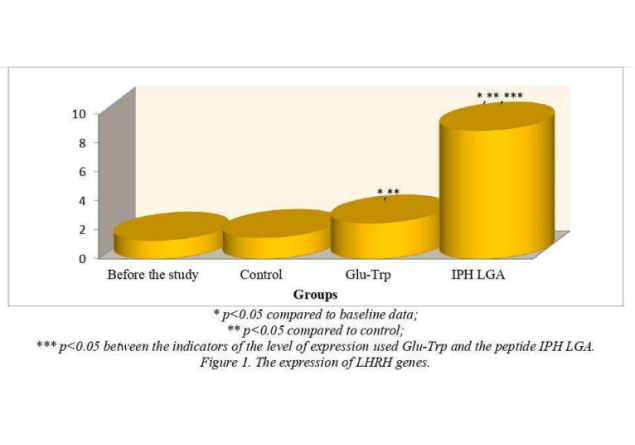
The effect of the peptide IPH LGA on the expression of SSEA-4 and p53 protein in human cell cultures is shown in figure 2 and 3. It was found that the application of the peptide IPH LGA reduces the expression of SSEA-4 in 5.6 times from the baseline. These types of cells are detected in prostate cancer and other tumors in the human body.
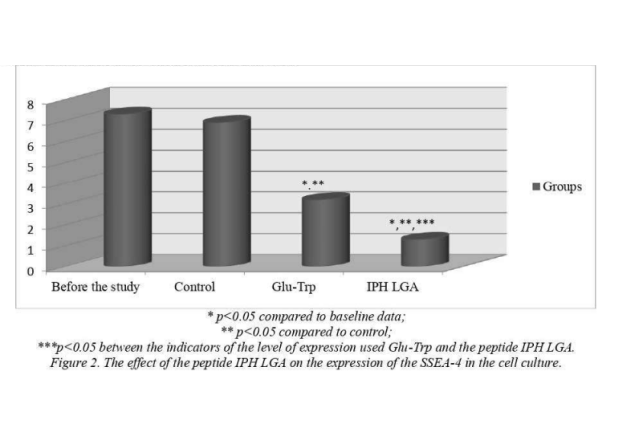
Consequently, the application of the peptide IPH LGA is protected against cancer, in particular, against malignant tumors of the urine-reproductive system according to the level of expression of the marker SSEA-4 on cell culture.
The effect of the peptide IPH LGA on the expression of p53 protein in cell cultures is presented in figure
3. The application of the peptide IPH LGA increases the production of protein p53. which is a transcriptional factor and acts as a suppressor of malignant tumor formation by the way of activating apoptosis in the tissues. This results lead to the conclusion about the antitumor properties of the peptide IPH LGA.
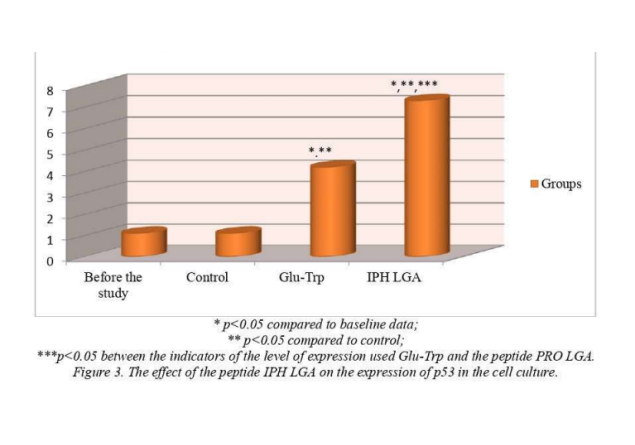
P53-dependent apoptosis also avoids the accumulation of mutations. Tn the case when mutations have already arisen, p53-dependent apoptosis allows to eliminate this potentially dangerous cells. On this fact we can make a conclusion about the cytoprotective effect of the peptide IPH LGA.
The peptide IPH LGA had a high onco-protective activity in relation to the cells of the reproductive system of men according to the expression of biological molecules in cell culture.
rats of the control group revealed hypertrophy of testicular tissues during the experiment. The volume increase was in 2.4 times compared to normal data. But the increase in the volume of testes was noted only in 1.3 times from the norm in the main group.
We found that the development of chronic inflammation in the testes in
The area of ischemia were revealed in the amount of 56.1+1.1% of the total area in the sections of the testes of rats of the control group. While in the rats of the main group the area of ischemia were revealed in the amount of 45.2+0.9% of the total area and was in 1,2 times significantly less than in the rats of the control group, p<0.05 compared to the control group. This is probably due to increased pressure in the testes due to the development of stagnation in the prostate gland based of the developed immune inflammation.
Consequently, the peptide IPH LGA reduces the degree of inflammation and normalizes the function of the cells of the testes according to experimental model.
In this experiment it was found to increase reproductive function in males rats, which additionally intro duced the peptide IPH LGA.
Thus, in the rats of the main group the concentration of sperm on the slice was in 2.4 times higher than in the rats of the control group. The area of pathological sperm in the control group were 34.6+1.1%, which was significantly higher than in the main group, which was 23.140.7%, p<0.05 compared with the control group (figure 4).
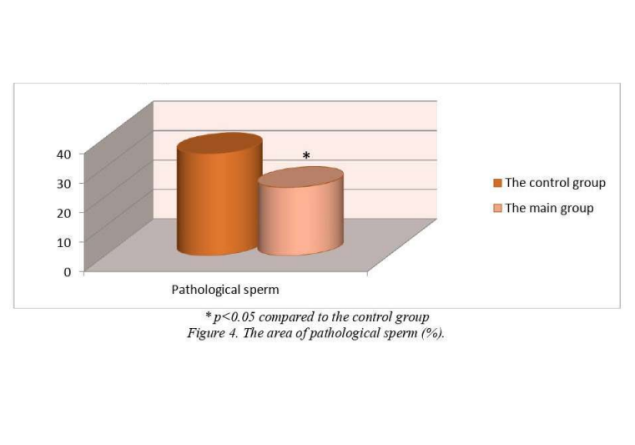
The males rats in the control group showed a decrease in fertilizing capacity when mating with females: the number of inseminated females was reduced by 23.5+1.3%, and the number of pregnant females was only 56.6+1.6% instead of 82.6+1.5% in the main group.
Therefore, the use of the peptide IPH LGA has a protective effect on the cells of the testes and increases the fertilizing capacity according to the experimental model in rats by increasing the activity of sperm.
The results of a clinical study have shown, that the men with age-related androgen deficiency had a typically picture of the result of mainly hormonal changes in the body, characteristic of this age group. It is possible that the severity of these manifestations in younger people is also due to the influence of various adverse external factors and psycho-emotional overloads.
There was an increase in blood glucose in some patients, which probably indicates a “breakdown” of the insulin regulation system. The typically picture was the change in blood levels of male sex hormones (table 1).
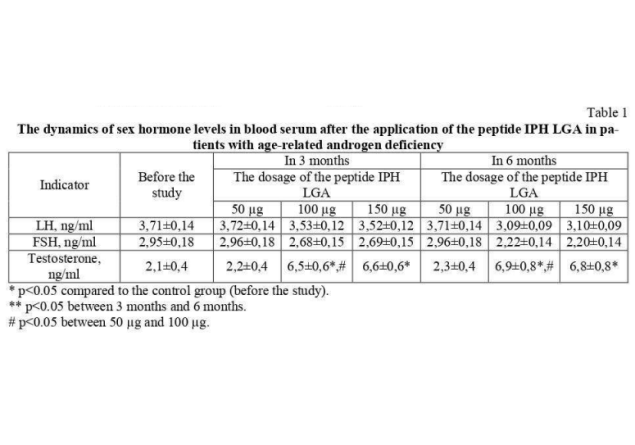
After 3 months of the application of the peptide IPH LGA in patients with age-related androgen deficiency there was a significant increase in testosterone levels by 3.1 times with the preservation of these values and after 6 months compared to the baseline, which was at the lower limit of the norm.
The microscopic examination of the ejaculate was indicative. There was an increase in the number of sperms and their mobility, a decrease in pathological forms of sperms, a decrease in the number of leukocytes.
We assessed the quality of life using the questionnaire EuroQol EQ-5D. The dynamics of the results in patients with age-related androgen deficiency after 3 and 6 months the application of the peptide IPH LGA is shown in table 2.
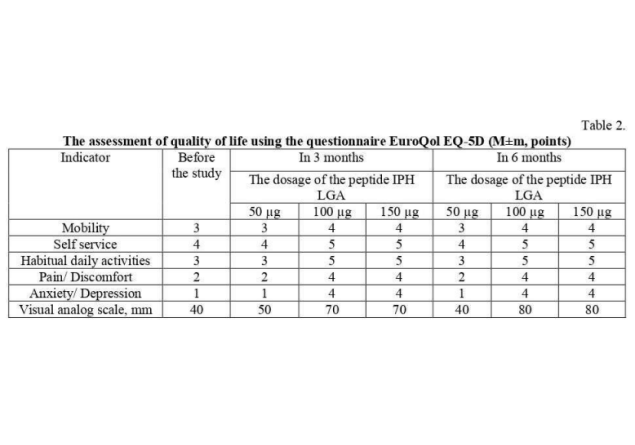
Thus, the quality of life of patients has improved for each parameter, as much as possible in the terms of the usual daily activities and self-service.
It is important to emphasize that the level of anxiety and depression decreased in 4 times after the application of the peptide IPH LGA after 3 months and remained throughout the study.
It should be noted that the subjective assessment of quality of life on a visual-analog scale increased in 1,8 times in 3 months after the use of the peptide IPH LGA and in 2 times in 6 months of the peptide.
We haven’t found significant differences between the results in the application of 100 mcg and 150 mcg in all the studied parameters like in 3 months as in 6 months. Also, we have not found significant differences between the indicators in the application of 50meg and before the study on all parameters. This fact proves that the effective optimal dosage for the peptide IPH LGA is 100 mcg.
The studies confirm the high biological activity of the peptide IPH LGA in relation to the control of the normal formation of hormonal system, regulating the action on the functional activity of the testes and spermatogenesis in humans at the genetic level according to gene expression in cell culture. The data indicate a high oncoprotective activity of the peptide IPH LGA in relation to the cells of the reproductive system of men according to the expression of biological molecules in cell culture.
It has also been proved that the peptide IPH LGA has anti-inflammatory and normalizing effect on the cells of the testes according to experimental studies, as well as increases reproductive function by increasing the activity of sperm according to experimental studies.
We have found that the use of the peptide IPH LGA has a restoring effect on the functional activity of testicular cells, promotes the restoration of reproductive function in men and the normalization of functions in men with age-related androgen deficiency, which improves the quality of life and prevents the development of anxiety-depressive syndrome in such patients according to clinical studies.
The application of the peptide IPH LGA is recommended as a supplement and in combination with any drugs of etiological, symptomatic and pathogenetic therapy, which used to treat reproductive disorders in men and age-related androgen deficiency, in the most effective dosage of 100 pg per day as a supplement of regulating the functional activity of the testes.
With the support of «Ideal Pharma Peptide GMBH», Ferdinandstr. 11 61348 Bad Homburg.
 IPH – PEPTIDES
Read more
IPH – PEPTIDES
Read more